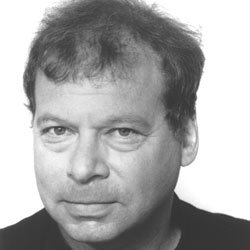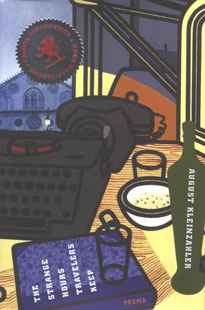Griffin Poetry Prize 2004
International Winner
Book: The Strange Hours Travelers Keep
Poet: August Kleinzahler
Publisher: Farrar, Straus & Giroux

Biography
August Kleinzahler published his first book of poetry, A Calendar of Airs, in 1978. Since then, he has published six others, including Storm over Hackensack (1985); Earthquake Weather (1989); Red Sauce Whiskey and Snow (1995); and Green Sees Things in Waves (1998). In 2000, Farrar, Straus & Giroux published Live from the Hong Kong Nile Club: Poems 1975-1990. His poems have appeared in numerous publications including The New Yorker, The American Poetry Review, Poetry, Harper’s Magazine, Grand Street, The Threepenny Review, and The Paris Review. A native of Jersey City, Kleinzahler is the recipient of awards from the John Simon Guggenheim Foundation (1989), the Lila Acheson-Reader’s Digest Award for Poetry (1991), and an Academy Award in Literature from the American Academy of Arts and Letters (1996). In 2000 he was awarded a Berlin Prize Fellowship. His latest book, a collection of meditations entitled Cutty, One Rock: Low Characters and Strange Places, Gently Explained, was published in November, 2004 to considerable critical acclaim. He has also been named poet laureate of his hometown of Fort Lee, New Jersey.
Kleinzahler has been a taxi driver, a locksmith, a logger, and a building manager. He has taught creative writing courses at Brown University, the University of California at Berkeley, and the Iowa Writers’ Workshop, as well as to homeless veterans in the Bay Area. He lives in San Francisco.
See also
- August Kleinzahler, 2004 International Griffin Poetry Prize Winner, Opens the 2005 Awards Ceremony
- To celebrate the Griffin appearances at Poetry International in 2004, The Times Literary Supplement published new poems by Robert Bringhurst, Margaret Atwood, Anne Simpson and August Kleinzahler in their October 22nd issue. Enjoy those poems here.
Judges’ Citation
“The Strange Hours Travelers Keep is a masterful collection of work from a poet who inhabits the energies of urban life more fully than anyone currently writing. If August Kleinzahler’s poems notice birdsong, they do so by their own account as ‘part of a mix – footsteps, traffic, / fountains, shouts’. There is something exhilarating about passages of verse which are so ferociously on the move, between locations, between forms, between registers. These poems swagger and swerve and sing, while their moments of grace are ruthlessly sudden and just as swiftly abandoned to all the other stuff that’s happening in the universe. Kleinzahler’s poems also talk a lot about music, and they themselves live in the miraculous, conditional way that music does – finding their harmonies by moving forward.”
August Kleinzahler reads The Tartar Swept
The Tartar Swept, by August Kleinzahler
The Tartar Swept
The Tartar swept across the plain
In their furs and silk panties
Snub-nosed monkey men with cinders for eyes
Attached to their ponies like centaurs
Forcing the snowy passes of the Carpathians
Streaming from defiles like columns of ants
Arraying their host in a vasty wheel
White, gray, black and chestnut steeds
10,000 each to a quadrant
Turning, turning at the Jenuye’s command
This terrible pinwheel
Gathering speed like a Bulgar dance
Faster and faster
Until it explodes, columns of horsemen
Peeling away in all the four directions
Hard across the puszta
Dust from their hooves darkening the sky
They fall upon village and town
Like raptors, like tigers, like wolves on the fold
Mauling the sza-szas
And leaving them senseless in puddles of goaty drool
Smashing balalaikas
Ripping the ears off hussars and pissing in the wounds
They for whom the back of a horse
Is their only country
For whom a roof and four walls is like unto a grave
And a city, ptuh, a city
A pullulating sore that exists to be scourged
Stinky dumb nomads with blood still caked
On shield and cuirass
And the yellow loess from the dunes of the Takla Makan
And the Corridor of Kansu
Between their toes and caught in their scalps
Like storm clouds in the distance
Fast approaching
With news of the steppes, the lagoons and Bitter Lakes
Edicts, torchings, infestation
The smoke of chronicles
Finding their way by the upper reaches
Of the Selinga and the Irtysh
To Issyk-Kul, the Aral, and then the Caspian
Vanquishing the Bashkirs and Alans
By their speed outstripping rumor
Tireless mounts, short-legged and strong
From whose backs arrows are expertly dispatched
As fast as they can be pulled from the quiver
Samarkand, Bukhara, Harat, Nishapur
More violent in every destruction
This race of men which had never before been seen
With their roving fierceness
Scarcely known to ancient documents
From beyond the edge of Scythia
From beyond the frozen ocean
Pouring out of the Caucasus
Surpassing every extreme of ferocity
From the Don to the Dniester
The Black Sea to the Pripet Marshes
Laying waste the Ostrogoth villages
Taking with them every last cookie
Then dicking the help
These wanton boys of nature
Who shot forward like a bolt from on high
Routing with great slaughter
All that they could come to grips with
In their wild career
Their beautiful shifting formations
Thousands advancing at the wave of a scarf
Then doubling back or making a turn
With their diabolical sallies and feints
Remorseless and in poor humor
So they arrived at the gates of Christendom
From The Strange Hours Travelers Keep, by August Kleinzahler
Copyright © 2003
More about August Kleinzahler
The following are links to other Web sites with information about poet August Kleinzahler. (Note: All links to external Web sites open in a new browser window.)
- August Kleinzahler profile (The Academy of American Poets)
- Week-long electronic journal by August Kleinzahler (Slate)
Have you read The Strange Hours Travelers Keep by August Kleinzahler? Add your comments to this page and let us know what you think.
Photo credit: Star Black
